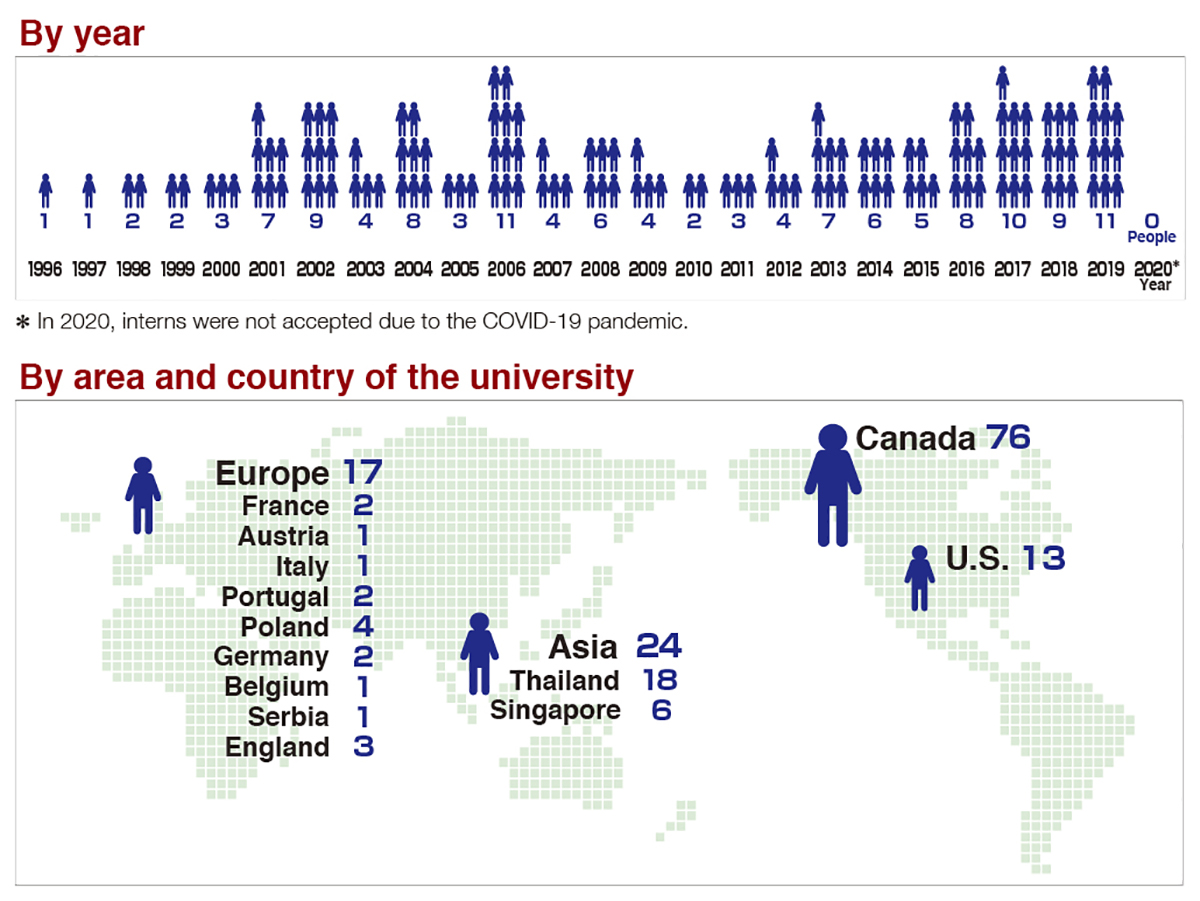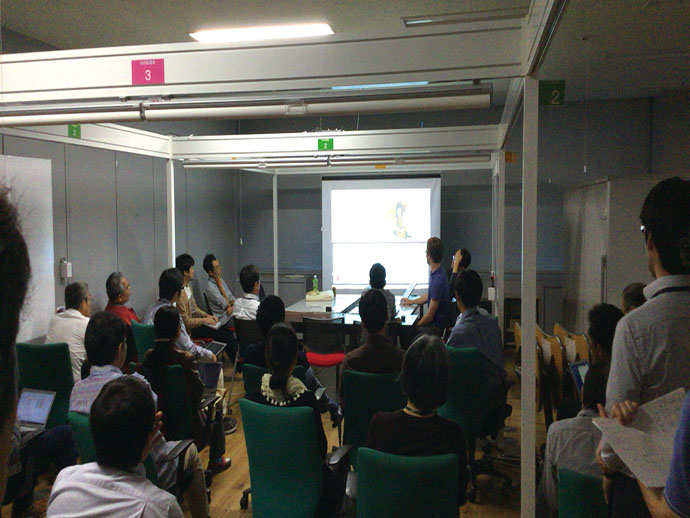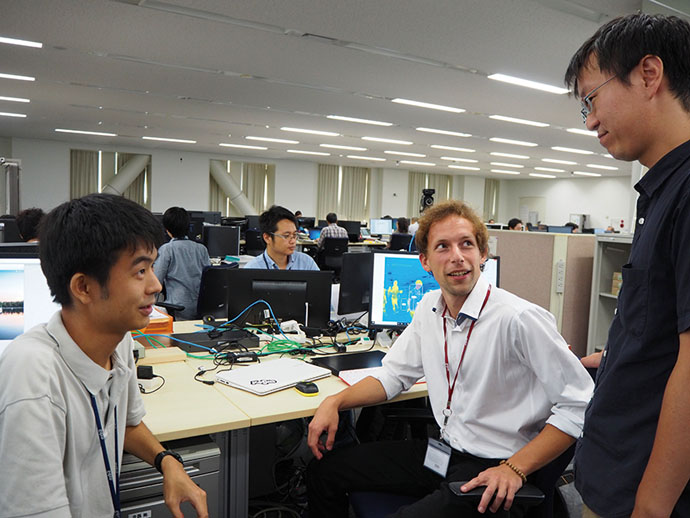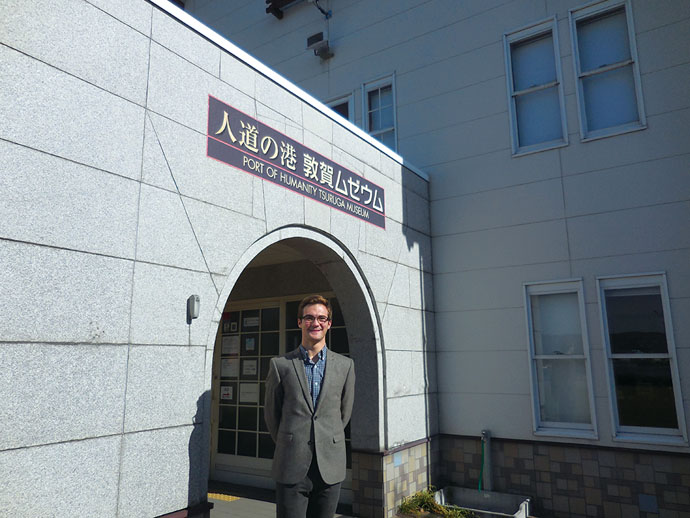Overseas Internship Programs Bring Growth for Azbil
Promoting and strengthening global exchange leads to HR development and expands partnerships and customer base worldwide, for sustainable growth of the organization
Azbil views the hosting of interns from abroad as a source of sustainable growth for the company, and is actively promoting it. Internship programs not only provide opportunities to hire excellent students from abroad, they also lead to better English proficiency and deeper understanding of people from different cultures by employees of the host departments. Moreover, they broaden the company’s partnerships and collaboration with universities abroad. By means of overseas internship programs that bring many advantages to both parties, Azbil aims to use global exchange to further develop the organization.
- Sustainable growth of the organization by accepting students from all over the world
- Global exchange as a valuable investment in the future
Sustainable growth of the organization by accepting students from all over the world
Internships in which university students gain work and business experience at a company for a certain period are viewed all over the world as important for students’ education and job search. Azbil Corporation actively accepts interns from both Japan and abroad.
The first intern from abroad came in 1996, back when the company was called Yamatake Corporation. At that time a company engineer was engaged in joint research with a Canadian university, which asked to send an intern to Japan. Since then, Azbil has accepted interns every year, and it has expanded the number of partner countries and universities or institutes. By 2019, the company had accepted 130 students from 13 countries or regions, including Canada, the U.S., Thailand, and Germany.
Currently Azbil accepts students from domestic universities for periods from one day to a few weeks as a part of the students’ job hunts. For students from abroad, long-term stays from two months to one year are available, and the students do actual work in the workplace. The purpose is not only to increase the company’s opportunities to hire excellent students from abroad, but also to help achieve two of its three fundamental policy goals, global expansion and being an organization that never stops learning, in order to ensure the sustainable development of the azbil Group. Internships, since they lead to corporate growth, are promoted mainly by the Azbil organization responsible for human resource development, Azbil Academy.
So far most of the interns have come from Canada (over 70 so far) via the Canada-Japan Co-op Program, which acts as an intermediary between Canadian universities and Japanese companies. Azbil posts the application guidelines and chooses interns after interviews by telephone or video conference via the Internet. The training period for this program is between seven months and one year, and the students receive university credit.
Starting in 2016, interns have also come from Thailand after referral by Nagaoka University of Technology in Japan. Two students are accepted every year for internships lasting from two to four months from Kasetsart University, King Monkut’s Institute of Technology, and Chulalongkorn University, which are known as the three major technical universities in Thailand. One of the interns from Chulalongkorn University joined Azbil as an employee in this year.
Further international energizing of the workplace comes from the program of the International Association for the Exchange of Students for Technical Experience (IAESTE), which specializes in internships for science and engineering students. One student is accepted from Europe every year.

Number of overseas interns (to 2020)
Global exchange as a valuable investment in the future
The work assignments of overseas interns are mainly in R&D, product development, and in engineering departments, with the specific job decided after considering the student’s specialty and interests and after discussion with the supervisor and employee instructors in the workplace. Examples of past work areas include the development of a valve simulator, development and experimentation with part of AI-based software for anomaly detection and advanced control, and research on camera image processing for automatic reading of meters.
Interns receive salaries and are provided with accommodations in an Azbil dormitory. At the end of the training period, interns compile a report on the technical issues they have tackled and how they will utilize the experience in the future, and they present their report to the department. Some interns’ comments are as follows: “It was the best experience of my life. Thanks to employees who helped me when I was having a hard time, I was able to take on the challenge of this project”; “I learned a sense of responsibility and autonomy from everyone at Azbil”; and “On days off, I walked around the city or went hiking, and I looked forward to having lunch in the dining hall.” It is clear that many interns are serious about work and about their subject matter, that they have become familiar with Azbil’s corporate culture and Japanese culture, and that their training period is a meaningful one.
Accepting interns from overseas also has great advantages for Azbil. Communicating with them in English helps to improve the English proficiency of the entire host department, and raises awareness of internationalization. The young employees who are the instructors for the interns gain management skills and may be able to utilize ideas that are not current in Japan in their work or research and development. In addition, employees have lunch with interns and guide them around tourist spots on holidays, which deepens relationships and encourages communication within the workplace. Thanks to internships, the company’s HR and sales departments have the advantage of stronger connections with universities and companies in various countries. In Thailand, in fact, after a recommendation from the university affiliated with an intern, a local company placed an order with Azbil Thailand Co., Ltd., for an energy-saving system.
Another type of internship has also begun, in which Azbil’s overseas subsidiaries host Japanese university student interns or domestic university student interns, further enlivening the exchange program. Last year, Azbil Thailand started accepting students from Chulalongkorn University, and in the future, Azbil Vietnam Co., Ltd. will start taking interns from Vietnamese universities.
Overseas internships not only contribute to the growth of the interns, they also expand the number of Azbil’s business partners and customers around the world. In that way, international exchanges contribute to the sustainable growth of the organization. As an investment in the future, Azbil will continue to actively promote internship programs.

Presentation of a report on the results of an internship.
Many Azbil employees who were involved with the internship have gathered.

Alexander Payovich from Serbia (seated) is currently active in an R&D department as an intern. Interns discuss the details of their work with Azbil employees, who provide guidance.
Serving as a bridge between Tsuruga and Polish history

Lucas Grabowski, a student at Warsaw University of Technology in Poland, visited Japan for the first time as an intern at Azbil for three months starting in August 2018, but he actually had a previous connection to Japan.
That story began in the 1920s, in the turmoil of the Russian Revolution. Around 760 Polish orphans who lost their parents in Siberia and could not return to their homeland were rescued by the Japanese Red Cross Society, brought by sea to the port city of Tsuruga in Fukui Prefecture, and were given refuge there. The orphans were given meals, snacks, and toys by the people of Tsuruga, and then were returned to their homeland by way of Tokyo or Osaka. Lucas’s great-grandfather Jan Jankovski was one of those orphans, and he told his family about his escape, so Lucas wanted to visit Japan some day.
At the suggestion of an Azbil employee who heard about this episode, Lucas visited the Port of Humanity Tsuruga Museum in October 2018, where material relating to the Polish orphans is exhibited. He walked in the footsteps of his great-grandfather, and thanked the mayor and citizens of Tsuruga for their welcome. This exchange between Tsuruga and the family of a Polish orphan, which bridged a 100-year gap and was triggered by an internship at Azbil, was reported by various media outlets.
This article was published on April 1, 2021.
